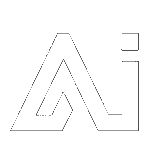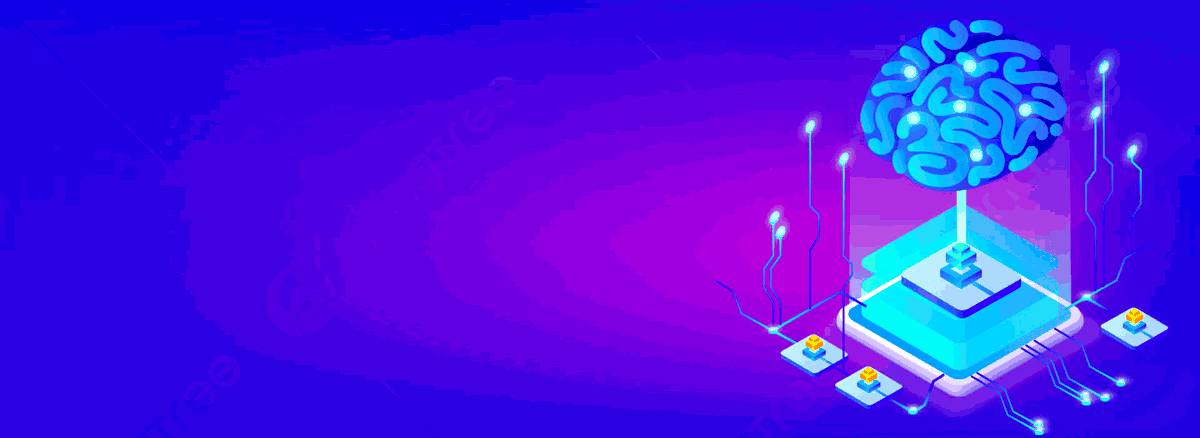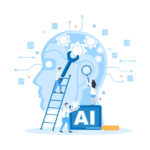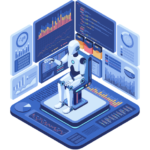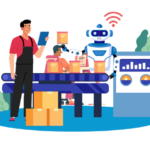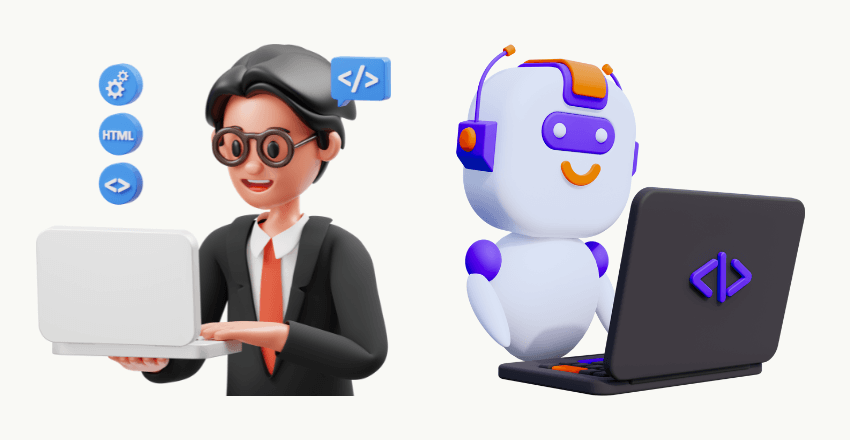 Can You Replace Your Developers with AI? Investigate the potential and limits of AI in taking over software development tasks.
Can You Replace Your Developers with AI? Investigate the potential and limits of AI in taking over software development tasks.
Artificial intelligence (AI) has been making waves in a variety of industries, and software development is no exception. With AI technology rapidly advancing, some have wondered whether it could replace human developers altogether. As a CTO, you may be wondering if this is a viable option for your company.
The Role of AI in Software Development
Artificial intelligence (AI) is rapidly transforming the software development industry, with the potential to automate many coding tasks and change the roles of developers within a development team. When integrated effectively, AI can provide significant benefits for software development projects.
The Advantages of AI in Software Development
One of the primary advantages of AI in software development is automation. With machine learning algorithms, AI can analyze vast amounts of data to identify patterns and generate code. This can significantly reduce the time and effort required for coding tasks, allowing developers to focus on more complex issues.
AI can also assist with tasks such as bug detection and optimization. By analyzing code and identifying errors or areas of inefficiency, developers can address these issues more quickly and efficiently.
Changing Roles for Developers
The introduction of AI in software development is also changing the roles of developers within a development team. With the automation of certain tasks, developers will need to focus more on higher-level problem-solving and creative tasks. Additionally, AI may lead to the creation of new roles focused on implementing and managing AI technology within development teams.
However, despite the potential advantages of AI in software development, it is important to recognize its limitations and the importance of maintaining a balance between AI and human developers.
AI’s Capabilities in Software Development
Artificial Intelligence (AI) has the potential to revolutionize the software development process through automation of various tasks. From code generation to bug detection, AI can assist developers in streamlining their workflow. Let’s delve into the capabilities of AI in software development.
AI Automation in Coding
One of the most promising capabilities of AI in software development is its potential for automation in coding. By analyzing large amounts of code, AI can identify patterns and generate new code that adheres to those patterns. This can significantly reduce the time and effort required for manual coding, freeing up developers to focus on more complex and creative tasks. Additionally, AI can automate the testing process, identifying and fixing bugs in code before it is even introduced into a project.
AI and Coding Roles
The role of AI in coding is not to replace human developers, but rather to augment their abilities. With the assistance of AI, developers can improve their code quality and accuracy, leading to better products and increased productivity. AI can also provide data and insights to developers, enabling them to make informed decisions and optimizations. While AI can assist developers in certain tasks, it cannot replace the creativity, problem-solving, and adaptability that are unique to human developers.
AI Limitations in Software Development
While AI has made significant advancements in recent years, there are still limitations to its capabilities in software development. One of the main areas where AI falls short is creativity. While AI can assist with routine tasks, such as code generation and bug detection, it lacks the ingenuity and critical thinking skills necessary for creative problem-solving.
Another area where AI struggles is in adapting to new and unexpected situations. While human developers can easily adjust to changing circumstances, AI is limited by its pre-programmed algorithms and may not be able to handle ambiguous or complex situations.
| AI in Software Development: | AI Limitations: |
|---|---|
| Code Generation | Creativity |
| Bug Detection | Adaptability |
| Optimization |
Despite these limitations, AI can still play a valuable role in software development. By automating routine tasks, AI can free up human developers to focus on more complex and creative endeavors. Additionally, AI can assist in identifying patterns and trends in data, enabling developers to make more informed decisions.
However, it’s essential to recognize the limits of AI and not rely solely on it for software development. Instead, a combination of AI and human developers can create a more dynamic and powerful development team.
Can AI Fully Replace Developers?
As discussed earlier, AI has the capabilities to automate certain aspects of software development and assist in various tasks, such as code generation and bug detection. However, the question remains: can AI fully replace human developers?
While AI has shown significant advancements in recent years, it cannot replace human developers entirely. AI lacks the creativity and problem-solving skills that human developers possess, and it cannot adapt to new situations or unexpected issues in the same way that humans can.
Furthermore, software development is often a collaborative effort, and human-to-human interactions and communication are essential. Human developers also have domain expertise and experience that AI lacks, which is crucial to understand the project’s underlying purpose and goals.
Therefore, while AI can automate certain aspects of software development and assist developers in their roles, it cannot replace human developers entirely. Instead, AI should be viewed as a valuable tool to augment human developers and enhance their abilities.
Benefits of Integrating AI in Development Processes
Integrating AI into software development processes can yield numerous benefits, enhancing efficiency, accuracy, and overall productivity. Here are some of the key advantages of implementing AI automation in coding:
| Benefit | Description |
|---|---|
| Improved Efficiency | AI algorithms can perform repetitive tasks at high speeds, freeing up human developers to focus on more complex and creative tasks. |
| Reduced Errors | AI can help detect and fix bugs, errors, and vulnerabilities more quickly and accurately than humans, leading to higher quality software. |
| Accelerated Time-to-Market | By automating certain tasks, AI can significantly reduce development timelines and speed up the delivery of projects to clients. |
| Enhanced Process Optimization | AI can analyze development processes and identify areas for improvement, allowing teams to optimize workflows and increase productivity over time. |
Overall, integrating AI into software development processes can provide teams with a competitive edge, enabling them to deliver higher quality software more quickly and efficiently.
Challenges in Implementing AI in Development Teams
While the benefits of integrating AI into software development processes are clear, there are also significant challenges that must be addressed. From the CTO’s perspective, implementing AI requires careful consideration and planning to ensure successful adoption and integration with existing workflows.
One of the primary challenges is building trust in AI. Developers may be skeptical about relying on automated algorithms and fear that AI will replace their jobs. It is critical to address these concerns by demonstrating the value of AI as a complementary tool that can improve productivity and performance.
Another challenge is integrating AI into existing development processes. This involves identifying areas where AI can be most effective and implementing appropriate tools and technologies. In some cases, it may be necessary to restructure teams and roles to accommodate the new technology.
Another challenge is transitioning from traditional development methods to those that incorporate AI. This involves upskilling existing developers and potentially hiring new talent with AI expertise. It also requires a shift in mindset, where developers need to view AI as a partner in the development process rather than a replacement for human developers.
Overall, implementing AI in development teams requires a strategic approach that considers the unique needs and challenges of the organization. By addressing these challenges head-on and leveraging the expertise of both AI and human developers, organizations can unlock the full potential of AI in software development.
Finding the Right Balance: Human-Computer Collaboration
As we’ve seen in previous sections, AI has the potential to greatly enhance the software development process, particularly in terms of automation and optimization. However, it’s important to recognize that AI is not a panacea for all development needs. Human developers still bring valuable skills to the table, including creativity, problem-solving, and adaptability.
Therefore, the key to success is finding the right balance between AI and human collaboration. This means identifying tasks that can be effectively automated by AI, while still allowing human developers to exercise their unique strengths. One approach is to incorporate AI as a tool to assist human developers, rather than as a replacement for them.
Another important consideration is ensuring that AI is used ethically and responsibly in the development process. This includes addressing issues of bias and ensuring that AI is not used to replace human jobs, but rather to augment and enhance them.
Ultimately, the most successful development teams will be those that embrace the synergy between AI and human developers, leveraging the strengths of both to create superior software solutions.
AI-Enhanced Tools and Technologies for Developers
As AI continues to revolutionize the software development process, developers can leverage a variety of AI-enhanced tools and technologies to augment their coding capabilities.
Code Completion and Generation
AI-powered code completion and generation tools can accelerate the coding process, reducing the time and effort required to write code. These tools use machine learning algorithms to analyze existing code bases and generate new code snippets that align with coding best practices and project requirements.
For example, Codota is an AI-powered code completion tool that uses deep learning algorithms to offer suggestions based on the context of the code being written. DeepTabNine is another AI code completion tool that uses a neural network to generate code snippets based on the patterns and structures found in existing code.
Bug Detection and Correction
AI can also assist in detecting and correcting bugs in code. By analyzing code in real-time, AI-powered tools can identify and flag potential errors, allowing developers to catch and correct bugs early in the development process.
One example of an AI-powered bug detection tool is DeepCode, which uses natural language processing algorithms to analyze code and identify potential errors based on coding best practices and common programming mistakes.
Intelligent Testing and Optimization
AI-powered testing and optimization tools can help developers identify and fix performance issues in their code. By analyzing code and identifying potential bottlenecks, these tools can suggest optimizations that improve code efficiency and speed.
For example, Diffblue is an AI-powered testing tool that automatically generates unit tests based on code changes, helping developers identify potential bugs before they can cause issues in production.
Virtual Assistants
AI-powered virtual assistants can provide developers with real-time insights and recommendations as they work on code. These assistants can analyze code and provide suggestions for improvements, helping developers write better code faster.
One example of an AI-powered virtual assistant for developers is TabNine, which offers real-time code completion and suggestions as developers work. Microsoft’s Visual Studio IntelliCode is another virtual assistant that provides AI-powered code completion and recommendations based on patterns in existing code.
As AI continues to advance, developers can expect to see even more AI-enhanced tools and technologies that improve the software development process, making it faster, more efficient, and more effective.
Addressing Ethical Concerns with AI in Development
As the use of AI in software development becomes more prevalent, it’s important to address the ethical concerns that arise with its implementation. The following are some of the most pressing ethical concerns:
Bias
AI systems can perpetuate or amplify biases that already exist in society. For example, a job application screening AI program may discriminate against candidates based on gender or race if it has been trained on biased data. To address this concern, it’s important to ensure that AI systems are trained on diverse and unbiased datasets.
Privacy
AI systems may collect and store vast amounts of personal data, which can be misused or hacked. To address this concern, it’s important to implement strict measures to safeguard sensitive data and ensure that any data storage complies with ethical and legal standards.
Job Displacement
There is concern that the widespread adoption of AI in software development may result in job displacement. While AI can automate many tasks, it cannot replace the creativity, problem-solving, and adaptability that human developers bring to the table. To address this concern, it’s important to find the right balance between AI and human developers in development teams, and to consider re-skilling and upskilling opportunities for developers who may be affected by job displacement.
CTOs must consider these ethical concerns when implementing AI in development teams. By addressing these concerns, they can ensure that the use of AI in software development is ethically responsible and beneficial for all.
Implementing AI in Your Development Team
Implementing AI in your development team can be a complex process, but with a clear plan and the right resources, it can lead to significant benefits in terms of efficiency, accuracy, and innovation. Here are some practical considerations to keep in mind when bringing AI into your development team:
Assess Your Needs and Resources
Before diving into AI implementation, it’s important to evaluate your development team’s needs, goals, and available resources. This includes identifying the specific areas where AI can be most beneficial, such as automating repetitive tasks, improving code quality, or enhancing user interfaces.
You’ll also need to evaluate your team’s technical expertise and determine whether you have the necessary skills in-house to implement and maintain AI technologies or if you need to bring in external expertise.
Develop a Plan and Set Realistic Goals
Once you have a clear understanding of your needs and resources, you can develop a comprehensive plan for introducing AI into your development team. This should include a roadmap for implementation, including timelines, milestones, and metrics for measuring success.
It’s important to set realistic goals for your AI implementation, both in terms of what you hope to achieve and the resources required to get there. This can help manage expectations and ensure that your team stays focused on achieving tangible results.
Invest in AI Training and Education
As AI becomes an increasingly important part of software development, it’s crucial to invest in training and education for your development team. This can include upskilling existing team members in areas such as machine learning, data science, and natural language processing, as well as hiring new team members with expertise in these areas.
Training and education can be delivered through a variety of formats, including online courses, workshops, and mentorship programs. It’s important to develop a plan that is tailored to your team’s specific needs and learning styles.
Integrate AI Tools and Technologies
There are a variety of AI tools and technologies available that can enhance your development team’s capabilities. These can include tools for code analysis, automated testing, and natural language processing. It’s important to evaluate these tools and determine which are most relevant to your team’s needs.
Integrating these tools can require some initial investment and configuration, but can lead to significant improvements in efficiency and accuracy over time.
Emphasize Collaboration and Communication
Integrating AI into your development team requires a shift in mindset and culture, emphasizing collaboration and communication between human and machine. It’s important to establish clear lines of communication between team members and ensure that everyone understands their role in the development process.
Encouraging a culture of experimentation and creativity can also help foster innovation and ensure that your development team is taking full advantage of the potential of AI.
Consider Ethics and Security Implications
As with any new technology, there are ethical and security implications to consider when implementing AI in your development team. This includes issues such as bias, privacy, and data security.
It’s important to establish clear guidelines and best practices for working with AI, including ensuring that data is sourced ethically and securely, and that potential biases are identified and addressed.
By following these best practices and investing in the right resources and education, you can successfully integrate AI into your development team and reap the benefits of this exciting new technology.
Final Thoughts
It’s important to recognize the potential of AI in software development while also acknowledging the limitations and ethical considerations that come with it. By finding the right balance between AI and human developers and investing in AI-enhanced tools and technologies, we can accelerate our development processes, reduce errors, and drive innovation.
Ultimately, the key to success lies in embracing the synergy between AI and human developers. By working together, we can create powerful, efficient, and innovative software that meets the needs of our users and drives business growth.
External Resouces
https://www.diffblue.com/
FAQ
FAQ 1: Is it feasible to replace my development team with AI?
Answer: Completely replacing a development team with AI is not currently feasible. AI can automate specific tasks, like code generation or bug fixes, but it lacks the creative and critical thinking abilities of human developers. AI tools, such as GitHub Copilot, can assist developers by suggesting code snippets based on comments or prompts.
Here’s an example of how you might use an AI tool to generate code:
# Assuming an AI tool integrated into your IDE or development environment
# Developer writes a comment or prompt:
# // Generate a function to add two numbers in Python
# AI tool suggests:
def add_numbers(a, b):
return a + b
# The developer reviews, edits, or directly uses the generated code.This code snippet demonstrates AI’s role as an assistant rather than a replacement, enhancing productivity and efficiency.
FAQ 2: Can AI develop complex software applications from scratch?
Answer: AI’s current capabilities do not extend to developing complex software applications from scratch. AI can contribute by automating certain aspects of development, such as writing boilerplate code, identifying potential code optimizations, or even suggesting fixes for known bugs.
However, the oversight, decision-making, and architectural design still require human intervention. For instance, AI can help optimize a function for better performance:
# Human developer writes:
def find_max(list):
max = list[0]
for number in list:
if number > max:
max = number
return max
# AI suggests an optimized version:
def find_max_optimized(list):
return max(list)While AI suggests improvements, understanding the broader impact and making final decisions rests with human developers.
FAQ 3: How can AI assist rather than replace developers?
Answer: AI can significantly assist developers by streamlining the coding process, reducing repetitive tasks, and even detecting potential errors before they become problematic. Tools like code completers and bug predictors can enhance a developer’s work without replacing the need for human expertise.
For example, an AI-powered bug detection tool could look like this:
# Developer writes code with a potential bug:
def calculate_discount(price, discount):
return price - (price * discount)
# AI-powered tool flags a potential issue:
# Warning: Ensure 'discount' is expressed as a decimal value to avoid incorrect calculations.This example shows how AI can alert developers to potential issues, guiding them towards best practices and preventing common mistakes.
Benjamin Bale is a distinguished expert in the field of AI development and an esteemed author for the “Hire AI Developer” blog. With a remarkable decade-long experience in the industry, Benjamin has cemented his reputation as a leading authority in AI app and website development, as well as AI backend integrations. His profound passion for AI and its transformative potential is evident in every aspect of his work.
Benjamin’s journey into the world of AI began at Edinburgh University, where he pursued his studies in AI and Mathematics. It was during this time that he cultivated a deep understanding and fascination for the subject. Throughout his career, Benjamin has accumulated extensive experience working with industry giants such as Goldman Sachs, Tencent, and Ali Express. These invaluable experiences have not only sharpened his skills in integrating existing systems with AI APIs but have also solidified his status as a consummate professional in the field.
Currently residing in the vibrant city of London, Benjamin finds solace in his role as both an author and developer. Beyond his professional endeavors, he takes great joy in the company of his faithful canine companion, Chad, and indulges his passion for snowboarding in the picturesque mountains of France. Benjamin’s unwavering dedication to advancing AI technology, combined with his wealth of knowledge and practical expertise, make him an invaluable asset to the “Hire AI Developer” team and an invaluable resource for readers seeking profound insights into the realm of AI.
